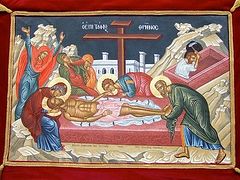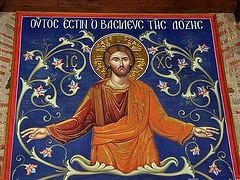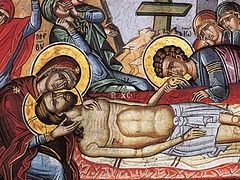In the name of the Father, and of the Son, and of the Holy Spirit!
We have gathered today in church in the name of the Son of God. They say that were He to come to Earth again today, many would again not know Him.
Every year, century after century, on Holy Friday priests bring out a special icon to the center of our Orthodox churches. This icon is described with exact precision in the Church canon which we will read today—the icon of a solitary, naked, and beaten dead body.
The holy Church enjoins all Orthodox Christians to stand before this icon today, and ask ourselves, “Do I recognize Him?”
Do you recognize in this lonely, bare, and battered dead body the Almighty God, your Creator?
Do you recognize your Savior, come into this world, irrevocably entangled in fatal blunders and in horrendous atrocities? He came with but one purpose: to deliver us from the inevitable and deadly consequences of our crimes, and from the incalculable and monstrous evil which we have brought into God’s world.
Do you recognize in Him He in Whom lie all your inner aspirations and hope, connected both with this life and with the future age?; He to Whom we build beautiful churches, to Whom we address our prayers, Who satisfies thy desire with good things (Ps. 102:5)?
Do you recognize in this truly terrible icon He to Whom we run with pleas for forgiveness of sins; He Who compassionately washes them every time, by His blood?
Do we recognize in this naked and lacerated body He Whom we request to grant us the true and priceless Divine gift—the Kingdom of Heaven, full of joy, happiness, and peace, where there will be no suffering, and no “sickness nor sorrow nor sighing, but life everlasting?”[1] And He gives this Kingdom, the price of which we see before us.
And finally, do we recognize these wounds?
The God-man is mysterious and incomprehensible for us! But the wounds that caused His death are very well known by us. They are our sins. They are ruthlessness towards God and man, and the shameless crimes of our autocratic passions before the holy truth of God.
And again—who do we recognize in our very selves, when at the end of Great Lent the holy Church places the holy Plaschanitsa before us?
Every time, entering a church, we are appearing not just at some place in our world. We find ourselves at the judgment of God. The Church unequivocally warns us about this in the days of preparation for Great Lent, with the parable of the Public and the Pharisee. But Holy Friday is a time of special judgment over a Christian after the arena of Holy and Great Lent. What are the fruits of these days, so important for our spiritual lives? Everyone will inform his own soul about that, when he comes to venerate the image of the solitary, naked, and wounded one. In these moments, having followed the Pharisee, our soul will praise God: “God, I thank Thee that I did not take part in this terrible crime, committed by the high priests, scribes, Pilate, and Roman soldiers!”
Or, not lift[ing] up so much as his eyes unto heaven (Lk 18:14), although standing before the incarnate One on earth, reviled, wounded, demonized, but the true God of Heaven, we can only dare to say, “God, be merciful to me, a sinner.”




